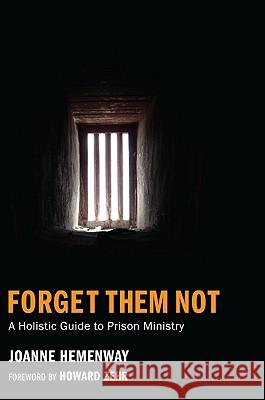Forget Them Not » książka
Forget Them Not
ISBN-13: 9781608993208 / Angielski / Miękka / 2010 / 184 str.
Forget Them Not
ISBN-13: 9781608993208 / Angielski / Miękka / 2010 / 184 str.
(netto: 94,38 VAT: 5%)
Najniższa cena z 30 dni: 97,46
ok. 16-18 dni roboczych.
Darmowa dostawa!
To witness effectively and powerfully to Christian testimonies of care and compassion, of justice and mercy, of healing and wholeness, it is necessary to foster awareness of the realities of the present system of retributive justice if there is to be any hope of transformation to a system of justice which is restorative. Forget Them Not provides a history of the prison system as a means of punishment contrasting it with the relatively recent but growing practice of restorative justice. Joanne Hemenway explores the concept of disconnection as radical evil, as a separation from God who is the source of our being, and shows how our present approach to punishment fosters this evil. The present system, with its motif of retributive justice, generates shame, rejection, and loneliness which stokes the fires of anger and rage. This breeds deep disconnection which only serves to fuel further cycles of violence. Hemenway presents three vignettes designed to help explore forgiveness in the context of both retributive and restorative justice. To promote healing and connection, Forget Them Not introduces compassionate witnessing in prison ministry as a way to develop awareness and empowerment. ""With extraordinarily fine writing, a passionate voice, and a powerful articulation of a vision of healing for our criminal justice system Joanne Hemenway invites congregations to live a witness of compassion and justice by becoming involved in prison ministry . . . For anyone who cares about transforming our prison system and ministering to those behind bars this book will help you do so with greater effectiveness and commitment."" --Brita L. Gill-Austern Andover Newton Theological School. ""It's time the Christian Church confronted issues of 'justice' that perpetuate retribution. With an eye toward forgiveness and healing and a refreshing approach to prison ministry, Hemenway offers a strong argument (and several good models of application) to advance restorative justice. Based on cultivating a common humility to keep us rooted in our own humanity, her approach is inspiring. This is truly an insightful journey to empowerment "" --Lanny Kutakoff Partakers ""In this publication Joanne Hemenway offers a guide of tremendous import to all clergy and congregations. With one in every hundred adults in the United States behind bars, prisons are no longer peripheral institutions . . . Guided by the principles actively preached and lived by Jesus and drawing on concepts from restorative justice, Hemenway stirs our passion for good and guides us to greater insight, compassion, and action."" --Robin Casarjian The Lionheart Foundation ""That we are all victims, perpetrators, and witnesses of abuse is central to Hemenway's vision for relational healing. Those who are incarcerated in our prisons are a part of this human family dilemma, an argument of individual and social import, which our churches and communities of faith must address for the sake of their soul and the life of the nation . . . One feels the beat of Matthew 25:36: 'I was sick and you looked after me, I was in prison and you came to visit me, ' signs of the 'beloved community' and realm of God's grace."" --Rodney L. Petersen Boston Theological Institute Joanne Hemenway received her doctorate of ministry degree from Andover Newton Theological School. She has been actively involved in a variety of prison ministries, including Partakers/Boston University College Behind Bars program. She is a member of the Religious Society of Friends (Quakers).











